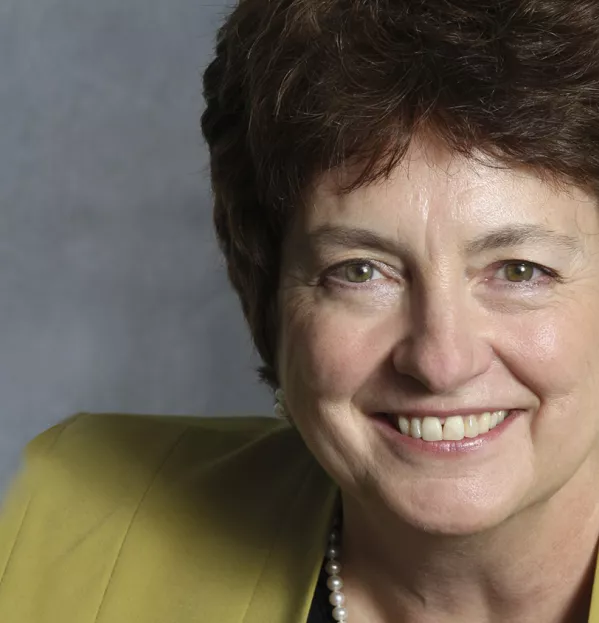‘We’re passionate about doing the right thing’

Janet Brown doesn’t have to think for long when you ask her what the biggest misconception about the Scottish Qualifications Authority (SQA) is.
“That it’s all our fault!” she says, smiling with a slight grimace.
The “all” in her pithy answer covers a lot. SQA, where Brown has been chief executive since 2007, has frequently been the focus of teachers’ ire in recent years, whether over controversial exams, breakneck changes to qualifications, perceived slights on the profession, or just a general sense that SQA is an aloof and opaque sort of organisation.
During one grilling by MSPs at the Scottish Parliament, Brown became momentarily emotional as she underlined that, for all the failings SQA has been accused of, its staff care deeply about what they do.
When Tes Scotland travels to SQA HQ in Glasgow to interview Brown, she rails against any suggestion that she presides over a “cold, unthinking, uncaring group who just administer stuff” and gives a little insight into the mood in the building when things go awry.
“We look like a sort of faceless bureaucracy, but we’re actually made up of people who have children, who had children, have relatives who have children,” she says. “We’re passionate about doing the right thing, and the day that something goes wrong here, the stress in here is not because of what [the media are] going to write, it’s because people in here believe that they’ve let somebody down.”
Despite the involvement of thousands of teachers in the SQA business of vetting and issuing qualifications, a cursory trawl through recent history reveals a number of times when the profession has been at loggerheads with the authority. Earlier this year, for example, there was an outcry after SQA decided to delay teachers’ access to question papers until the day after exams. The decision was soon reversed, but only after EIS union general secretary Larry Flanagan accused SQA of “putting the management of its own public image ahead of the desire of pupils to discuss exam papers with their teachers”.
Unpopular viewpoints
Brown concedes that SQA needs to get better at communicating with teachers, and at “explaining what we do”. She puts her hands up to some SQA mistakes, such as the 2015 Higher maths paper, which was too hard and resulted in a pass mark of 34 per cent.
But there is a flinty quality to Brown which, over the years, has seen her refuse to back down from unpopular viewpoints if she feels SQA is in the right.
A case in point: a year after complaints that SQA advice on help given to pupils with coursework was effectively accusing teachers of cheating the system, Brown still insists this was the right thing to do.
“Our role is to ensure the credibility and quality and standards of the qualifications system in Scotland, so that [students] can get a qualification that is valued by anybody across the world - and that sometimes means that we need to give people hard messages,” she says.
SQA figures released last month showed that cases of teachers “over-directing” students in coursework rose from nine in 2011 to 90 this year, while there had been 40 cases of proven malpractice in 2017 so far, against 18 last year. Brown says that “we have a very strong quality-assurance process” with “lots of safeguards”. When asked how often these students might receive qualifications they do not merit, she says: “It’s minor - it’s not something that’s causing a lot of concern.”
Quality assurance has been streamlined over the years, creating concerns over a possible drop in standards. Brown says the process was “measured”, focusing on centres - the catch-all word for what is usually a school or a college - delivering new subjects or subjects that “we’d seen in the past had some challenges in terms of standards”. She adds, however, that “we’ll obviously review” this targeted approach.

Asked about the biggest changes in Scottish education in her decade at SQA, Brown points to the greater involvement of industry in qualifications, such as customised awards for the North East’s oil and gas sector. She feels that the 2014 Wood report on vocational education was “really useful” in questioning whether everyone should be aspiring to Highers.
She praises centres such as West Lothian College for encouraging “academically inclined” students down a different route. Giving “really bright kids” a “completely different perspective on what they want to do in life” is crucial, says Brown - “they might be a lot happier” doing technical and vocational qualifications “than sitting in an office all day”.
Some 15 years after the conception of Curriculum for Excellence, however, the architects of that reform might have expected to have waved goodbye to an education system dominated by high-stakes exams. The two-term dash to Higher is still very much in existence, with individual and institutional success still largely measured by that a small window in the 13 school years.
However, Brown says: “I think everyone recognises that education should change slowly, because you need to make sure that you’re doing things in the appropriate way…So I think it’s not surprising that we’re still dealing and experiencing those discussions around, ‘Well, what does the senior phase really mean to everyone?’”
The biggest challenge for SQA in the next year or two, Brown says, will be “completing the revision of the national qualifications” - a reference to the phased removal of unit assessments, which were removed at National 5 last year and will now be excised from Higher.
Education secretary John Swinney signalled the end for unit assessments in 2016 - under heavy pressure from the EIS teaching union, which said the assessments forced duplication of swathes of coursework.
After SQA hurriedly made the changes, however, there were complaints that new N5 question papers represented a resurgence of high-stakes exams and that the removal of a “safety net” could cause more pupils to leave school without qualifications. Swinney later announced emergency measures to reintroduce unit assessments “in exceptional circumstances”. There were also concerns that the changes might add to teacher workload. Many complained the profession had not been adequately consulted.
‘We’ve learned a lot’
Brown expects to make “pretty similar” changes at Higher to those at N5, with details due in January. “We’ve learned a lot in how we did National 5 and we’ve identified…we’ve identified some of the things we need to be clearer on,” she says, adding that the changes provided an opportunity for a “significant reduction” in the jumble of often repetitive N5 guidance for teachers and to “remove the redundancy that was there before”, she says.
The future of National 4 - the poor relation of the suite of new qualifications - remains unclear. Critics say it lacks credibility among pupils and employers because it is only internally assessed. In August 2016, Brown told Tes Scotland that introducing an external exam was one option. More than a year later, she still sees “all options on the table”, with the matter being considered by the newly-formed Scottish Education Council.
Some have argued that SQA’s “monopoly” on qualifications means there is little incentive to innovate. But Brown says that its all-encompassing overview - covering not only schools but also colleges and diverse spheres such as prison education and training for care-home staff - drives innovation.
Prisons, for example, might be an outlet for virtual-reality assessment of vocational training, she explains, because the confinement of inmates interested in, say, construction clearly makes it more difficult for them to build a real wall or go through safety training. Games-based assessment, similarly, could be explored through private training partners before being unleashed on hundreds of schools.
“You wouldn’t bring that into the schools sector straight away, but you could work through that with the oil and gas industry, for instance,” says Brown. “So the innovation comes from the fact that we’ve got such a broad portfolio that we can operate under.”
The future will contain challenges aplenty - but, with the dust on new qualifications still a long way from settling, Brown has more than enough to do in the present.
You need a Tes subscription to read this article
Subscribe now to read this article and get other subscriber-only content:
- Unlimited access to all Tes magazine content
- Exclusive subscriber-only stories
- Award-winning email newsletters
Already a subscriber? Log in
You need a subscription to read this article
Subscribe now to read this article and get other subscriber-only content, including:
- Unlimited access to all Tes magazine content
- Exclusive subscriber-only stories
- Award-winning email newsletters